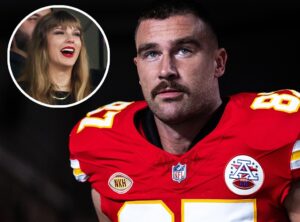Travis Kelce secretly paid one year’s rent for 87 families displaced by California wildfires — and it all started with a Taylor Swift song…
While driving, Travis heard “Soon You’ll Get Better” and was struck by the thought of families affected by recent wildfires. He quietly covered 12 months’ rent for 87 households — a nod to the jersey number he’s worn since the start.️
A Song That Sparked Hope
The California sun dipped low, casting a golden glow over the highway as Travis Kelce cruised in his truck, the radio humming softly. The Kansas City Chiefs star was on a rare off-day, driving through the state for a charity event. The radio switched to a familiar tune—Taylor Swift’s “Soon You’ll Get Better.” Travis, a fan of her music, turned up the volume. The lyrics, raw and hopeful, hit him hard. They spoke of struggle, of holding on through pain, of believing things would turn around. As the song faded, his thoughts drifted to the news he’d seen that morning: wildfires tearing through Northern California, displacing thousands, destroying homes. Families left with nothing but ashes and uncertainty.
Travis wasn’t a stranger to hardship. Growing up, he’d seen his own family scrape by, leaning on grit and love to get through tough times. The idea of families losing everything—roofs over their heads, a place to call home—gnawed at him. By the time the song ended, he’d made up his mind. He pulled over, called his manager, and said, “I want to help the wildfire victims. Let’s figure out how to pay rent for some families. For a year.”

His manager, used to Travis’s big heart, wasn’t entirely surprised but still paused. “Travis, that’s a big commitment. Rent in California isn’t cheap. You sure?” Travis didn’t hesitate. “I’m sure. Let’s make it 87 families—for my jersey number. A year’s rent, no strings attached.” Eighty-seven, his number since his rookie days, felt like the right way to mark this. A nod to the journey that brought him here, to a place where he could give back.
The plan came together quietly. Travis worked with his financial team and a California-based relief organization to identify families hit hardest by the fires. These were people who’d lost homes, jobs, and stability—parents working multiple jobs, veterans starting over, single moms stretching every dollar. The criteria were simple: families who needed a lifeline to rebuild. Travis’s only request was anonymity. He didn’t want headlines or thank-yous. He just wanted to help.
Finding 87 families wasn’t easy. The relief organization combed through applications, verifying stories of loss. There was the Garcia family, whose rental home burned to the ground, leaving them in a motel with two kids and no savings. There was Amara, a nurse who’d worked overtime to support her elderly mother, only to lose their apartment to the flames. And the Thompsons, a young couple who’d been saving for their wedding when their trailer park was reduced to rubble. Each story broke Travis’s heart a little more, but it also fueled his resolve.
The logistics were staggering. A year’s rent in California could range from $12,000 to $36,000 per household, depending on the area. For 87 families, the total climbed into the millions. Travis didn’t flinch. He set up a private fund, wiring the money through the relief organization to cover leases directly. Each family received a letter, simple and unsigned: “Your rent is paid for the next 12 months. Keep going. You’ve got this.” No mention of Travis, no hint of the NFL star behind it.

The first family to benefit was the Garcias. Maria Garcia opened the letter in their cramped motel room, expecting another bill. Instead, she read the words that changed everything. She sank to her knees, tears streaming, as her husband, Javier, read it over her shoulder. They’d been approved for a new apartment but had no way to afford the deposit, let alone rent. Now, they had a home again. Maria whispered, “Who does this?” They didn’t know, but they prayed for their anonymous donor every night.
Across the state, 86 other families opened similar letters. Amara and her mother moved into a small but cozy apartment, where Amara hung a photo of the old house they’d lost—a reminder of resilience. The Thompsons, stunned by their letter, signed a lease on a modest rental and used the breathing room to replan their future. One by one, 87 households found stability, a chance to rebuild without the crushing weight of rent.
Travis didn’t stop there. He wanted to add a personal touch, something to remind these families they weren’t alone. For each household, he mailed a small package containing a red cap with a gold “87” embroidered on it—a subtle nod to his jersey number. A note inside read, “You’re part of the team now. Keep fighting. —A Friend.” The gesture was small but powerful. Kids wore the caps proudly; parents kept them as talismans of hope.
For months, the act stayed under wraps. Travis went back to football, catching passes and dancing in the end zone, while the families he’d helped began new chapters. But secrets like this don’t stay quiet forever. A caseworker at the relief organization, moved to tears by the impact, shared the story with a local reporter, who posted it on X: “An anonymous donor paid a year’s rent for 87 families displaced by California wildfires. Each got a cap with the number 87. Any guesses who?” The post exploded, with fans speculating wildly. Travis’s name surfaced quickly—his jersey number was too big a clue.

The story spread like wildfire. Fans on X shared clips of Travis’s off-field kindness: signing jerseys for kids, visiting fire stations, now this. Skeptics demanded proof, but the relief organization confirmed the donation, keeping Travis’s name out of it at his request. The families, though, knew. Amara tweeted a photo of her mom wearing the “87” cap, writing, “Whoever you are, you gave us a home. Thank you.” The Garcias sent a letter to the Chiefs’ office, addressed to “Number 87,” with a photo of their kids in their new home, grinning in their caps.
Travis saw the posts but stayed quiet. He kept one of the caps on his dashboard, a reminder of why he did it. That song, “Soon You’ll Get Better,” had sparked something—a belief that he could make things better, even for strangers. He didn’t need the spotlight. The real win was knowing 87 families had a place to call home.
At a Chiefs game later that season, the jumbotron flashed a tribute to wildfire survivors. Among the crowd, 87 families stood together, some wearing their “87” caps, others holding signs that read, “Thank you, Travis.” The stadium erupted in cheers. Travis, on the sideline, gave a small wave, his eyes catching Maria Garcia’s. She mouthed, “You’re our hero.” He shook his head, pointing back at her. The hero, he knew, was in their resilience.
One song, one number, 87 homes. Travis Kelce proved that hope can rebuild what fires destroy.



